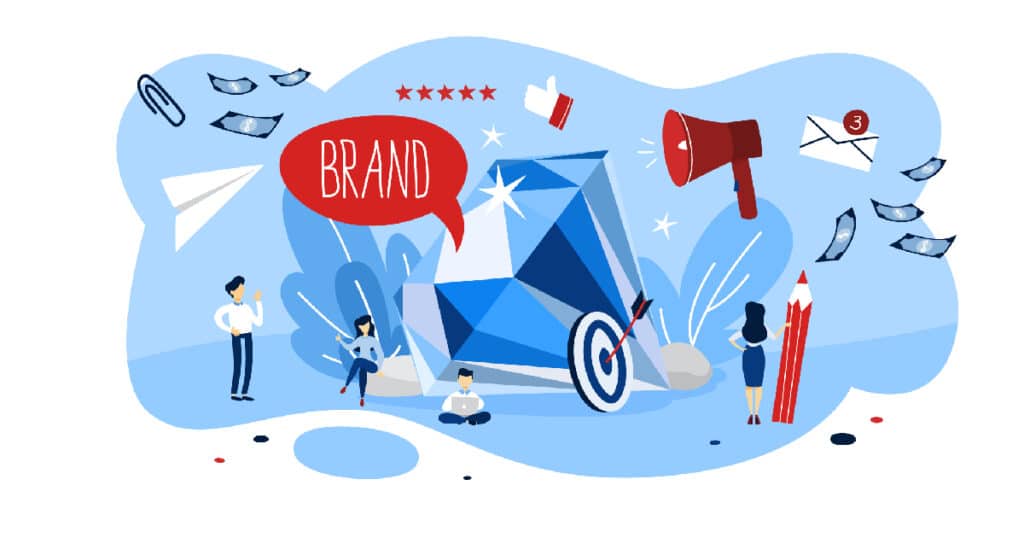Building and maintaining a strong brand is essential for success. One crucial aspect of brand management is brand equity. But what is it, and how can you build, maintain, and measure it? In this comprehensive guide, we will explore this concept of brand equity, its importance, and provide actionable tips on how to develop and nurture it effectively. So, let’s dive in!
What Is Brand Equity?

It refers to the intangible value and perception associated with a brand name or logo. It is the sum of all the qualities, perceptions, and emotions that consumers associate with a particular brand. It enables businesses to charge premium prices, build customer loyalty, and gain a competitive advantage in the market. It is a measure of the brand’s overall health and value.
The Components of Brand Equity
It consists of four primary components:
- Brand Awareness: The level of recognition and familiarity consumers have with a brand.
- Brand Associations: The mental connections consumers make between a brand and certain attributes, values, or benefits.
- Perceived Quality: Consumers’ perception of the overall quality and reliability of a brand’s products or services.
- Brand Loyalty: The degree of customer loyalty and attachment to a brand, leading to repeat purchases and advocacy.
How to Build it?
It equity requires a strategic and consistent approach. Here are some effective strategies to develop a strong brand equity:
Define Your Brand Identity
Start by clearly defining your brand identity. Determine your brand’s unique selling proposition (USP) and core values. This will help shape your brand’s positioning and personality, allowing you to differentiate yourself from competitors.
“Your brand is what other people say about you when you’re not in the room.” – Jeff Bezos
Deliver Exceptional Customer Experiences
Customer experiences play a vital role in building brand equity. Strive to exceed customer expectations at every touchpoint, from pre-purchase interactions to post-purchase support. Provide personalized experiences, address customer pain points, and create moments of delight.
Invest in Brand Marketing and Communication
Effective brand marketing and communication are key to building it. Develop a comprehensive marketing strategy that aligns with your brand’s identity and target audience. Leverage various channels such as social media, content marketing, and influencer partnerships to create brand awareness and engage with your audience.
Foster Brand Advocacy
Word-of-mouth marketing is incredibly powerful in building brand equity. Encourage your satisfied customers to become brand advocates by providing exceptional experiences, offering loyalty programs, and actively seeking and showcasing customer testimonials and reviews.
Consistency is Key
Maintain consistency across all brand touchpoints, including your visual identity, messaging, and customer interactions. Consistency builds trust and reinforces your brand’s identity, making it easier for consumers to recognize and remember your brand.
Innovate and Evolve
Stay relevant and adapt to changing consumer preferences and market trends. Continuously innovate your products or services to meet evolving customer needs. By staying ahead of the curve, you can maintain brand relevance and strengthen brand equity.
How to Maintain it?
Maintaining brand equity is an ongoing effort. Here are some strategies to help you sustain and strengthen it over time:
Monitor and Manage Brand Perception
Regularly monitor consumer sentiment and feedback regarding your brand. Leverage social listening tools and online surveys to gauge brand perception and identify areas for improvement. Actively address any negative feedback and reinforce positive brand associations.
Stay Connected with Your Audience
Maintain an active presence on social media platforms and engage with your audience. Respond promptly to customer queries and comments, and foster meaningful conversations. By staying connected, you can reinforce positive brand experiences and build lasting relationships.
Protect Your Brand's Integrity
Guard your brand’s reputation by actively monitoring and addressing any instances of brand infringement or misuse. Trademark your brand name and logo, and take legal action if necessary to protect your intellectual property. Maintaining brand integrity is crucial for preserving brand equity.
Continue Investing in Marketing and Advertising
Even when your brand equity is strong, it is essential to continue investing in marketing and advertising efforts. By maintaining brand visibility and relevance, you can reinforce brand associations and ensure that your brand remains top-of-mind for consumers.
How to Measure it?

Measuring brand equity helps you understand the effectiveness of your branding efforts and make data-driven decisions. Here are some key metrics and methods to measure it:
Brand Awareness Metrics
Track metrics such as brand recall, brand recognition, and social media mentions to gauge the level of brand awareness. Conduct surveys and focus groups to assess brand recognition among your target audience.
Net Promoter Score (NPS)
The Net Promoter Score measures customer loyalty and brand advocacy. By asking customers how likely they are to recommend your brand to others, you can quantify brand loyalty and measure the strength of your brand equity.
Brand Equity Index
Develop a brand equity index that combines various metrics such as brand awareness, perceived quality, and brand loyalty. Assign weights to each component based on their importance to your brand, and track the index over time to identify trends and improvements.
Market Research and Competitive Analysis
Conduct market research and competitive analysis to benchmark your brand’s performance against competitors. Assess factors such as market share, customer preferences, and brand perception to gain insights into your brand equity standing.
Brand equity is a critical asset for businesses in today’s competitive market. By understanding what it is and implementing strategies to build, maintain, and measure it, you can unlock the full potential of your brand. Remember, building it requires consistency, customer-centricity, and a deep understanding of your target audience. So, invest time and effort in developing a strong brand equity, and watch your brand soar to new heights of success.
FAQs
It brings numerous benefits to businesses, including:
- Ability to charge premium prices
- Increased customer loyalty and repeat purchases
- Higher market share and competitive advantage
- Enhanced brand recognition and recall
- Opportunities for brand extensions and partnerships
Absolutely! While it may seem daunting for small businesses, it is crucial for long-term success. By focusing on delivering exceptional customer experiences, defining a clear brand identity, and leveraging cost-effective marketing channels, small businesses can gradually build brand equity over time.
It is a long-term process that requires consistent effort and investment. The timeline can vary depending on various factors such as industry, competition, and marketing strategies. Generally, it takes several years to establish a strong brand equity, but the rewards are worth the patience and perseverance.
Yes, it can decline if not actively managed and nurtured. Factors such as negative customer experiences, brand scandals, or failure to adapt to changing market dynamics can erode brand equity. It is crucial to regularly assess and address any issues that may impact brand perception.
While it is an intangible concept, it can be measured quantitatively using various metrics and indices, as discussed earlier. By tracking brand awareness, customer loyalty, and other relevant metrics, businesses can gain insights into the strength of their brand equity and identify areas for improvement.
No, brand equity and brand value are different concepts. Brand equity refers to the perception and intangible value associated with a brand, while brand value represents the financial worth of a brand as an asset. Brand value takes into account factors such as market capitalization, brand revenue, and brand valuation methodologies.
Related articles:
 Anas is our go-to copywriter with a knack for crafting persuasive and high-converting eCommerce landing pages. His passion for words and understanding of consumer psychology helps turn visitors into loyal customers. When he's not refining his copy, Anas enjoys exploring the latest digital marketing trends and experimenting with new writing techniques. His blend of creativity and strategic thinking makes him an indispensable part of our energetic team.
Anas is our go-to copywriter with a knack for crafting persuasive and high-converting eCommerce landing pages. His passion for words and understanding of consumer psychology helps turn visitors into loyal customers. When he's not refining his copy, Anas enjoys exploring the latest digital marketing trends and experimenting with new writing techniques. His blend of creativity and strategic thinking makes him an indispensable part of our energetic team.












